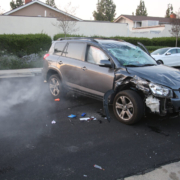Mental Health Behind the Wheel: How Stress and Anxiety Contribute to Trucking Accidents
The conversation around health has expanded in recent years to include the topic of mental health. That’s good news, especially for people who work high-stress jobs that impact both their mental and physical health. Truck drivers are not only the backbone of the nation’s economy—they are also at high risk of mental health issues due to their work environment and the importance of their work. It’s crucial to understand why mental health issues are common and how to decrease accident risk.
When accidents do occur, victims can take steps to get the care they need and fight for compensation. Call Bailey, Javins & Carter at 800-497-0234 to set up a time to talk to our team now.
Why Truck Drivers Are at Risk of Stress, Anxiety, and Mental Health Issues
If you look at a truck driver’s work environment and the demands placed on them at work, it’s easy to see how their job can put a strain on their mental health. Some of these issues include:
- Long hours: Truck drivers put in incredibly long hours. Under FMCSA regulations, they can drive up to 11 hours straight but may actually be in their truck for up to 14 hours before they’re done driving for the day. Even if a driver puts in 11 hours and stops immediately, that’s already longer than the standard eight-hour workday.
- Isolation: While truck drivers may get to talk to other drivers when they hit the truck stop at the end of the night, the majority of their days are spent alone. They are often separated from their families for days or weeks at a time, and that can take a toll on their mental and emotional well-being.
- Changing work schedules: Truck drivers’ schedules can change fairly regularly, depending on which hauls are available and when they must be delivered. This can make it challenging to adhere to a healthy sleep schedule.
- Physically demanding work: In addition to driving, truck drivers are often responsible for loading and unloading their trucks. This is physically tiring work.
- Limited access to healthy food and exercise: This job can be hard on a driver’s physical health, as they often rely on fast food and gas station food while on the road. Additionally, exercise opportunities may be limited. Poor physical health can contribute to poor mental health.
How These Issues Affect Their Driving and Accident Risk
Drivers facing constant stress and anxiety, as well as those with diagnosed mental health issues, may see their driving affected in many ways. First, mental health issues are very mentally tiring. This makes it harder to concentrate on the road, which can put drivers at greater risk of an accident.
Additionally, mental health struggles can lead to mental fatigue. Fatigued drivers are much more likely to cause an accident, and research indicates that driving while tired can be just as dangerous as driving while impaired.
To fight off the effects of fatigue, drivers may distract themselves with phones, tablets, podcasts, or media. This not only increases the chances of an accident, it makes a severe accident much more likely.
The stress of driving every day can pile up, especially in dense traffic. Some drivers lash out by driving aggressively. Aggressive driving is dangerous in any situation, but it is deadly when a truck driver is doing it.
Preventing Accidents and Supporting Truckers’ Mental Health
Promoting drivers’ mental health is key to supporting their well-being and decreasing accident numbers. Employers should prioritize mental health treatment and support, which includes not forcing drivers to take on more loads than they can safely manage. Drivers should also have access to flexible schedules that give them some ownership of their work and a chance to prioritize their health. Companies can also provide better access to healthcare in general to encourage a lifestyle of mental and physical health.
Find Out How Bailey, Javins & Carter Can Help You After a Crash
Have you been injured in a truck accident? You may be entitled to compensation—it’s time to find out. Schedule your free consultation with Bailey, Javins & Carter now by calling us at 800-497-0234 or contacting us online.









 How Does Driver Training Impact Trucking Accident Rates?
How Does Driver Training Impact Trucking Accident Rates?